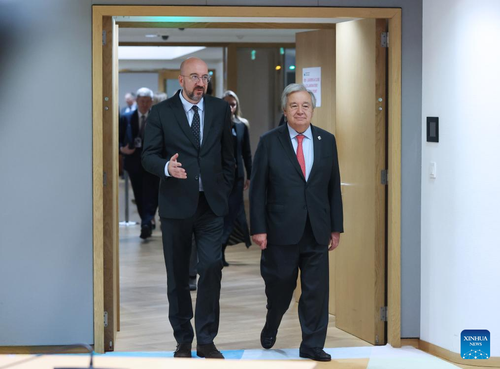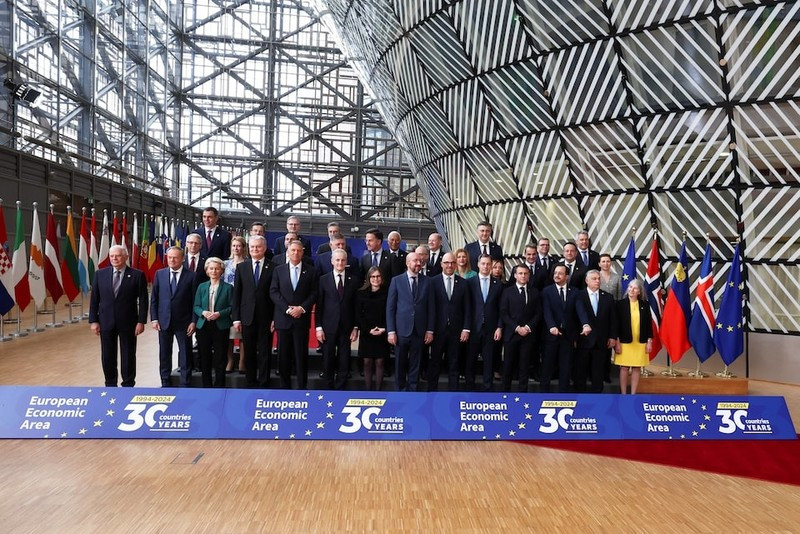At the recently concluded summit in Brussels, Belgium, leaders of the 27 EU member states outlined important policy directions on a series of urgent issues, from increasing its overall defence capabilities, expanding and reforming the alliance, and responding to the wave of migrants, to support for Ukraine and the crisis in the Middle East.
Strengthening Europe's overall defence capacities to match its needs and goals, as well as the capabilities of member countries, was among the focuses of this summit.
Leaders of member stated said that a stronger and more capable EU in the field of security and defence will contribute positively to global and transatlantic security and act as a complement to the North Atlantic Treaty Organisation (NATO).
To increase the EU’s defence readiness, EU leaders called for a substantial increase in defence expenditure as well as development and joint procurement to address critical EU capability gaps. In this regard, they invited the European Investment Bank to adapt its lending policy to the defence industry.
Following the progress made by Bosnia and Herzegovina on its reform path, and building on the recommendation by the Commission, EU leaders gave the green light to open accession negotiations. To this end, they invited the Commission to prepare the negotiating framework.
 |
| UN Secretary-General Antonio Guterres (R) and European Council President Charles Michel attend the European Union (EU) summit in Brussels, Belgium, on March 21, 2024. (Photo: Xinhua/Zhao Dingzhe) |
The leaders welcomed the progress made by Ukraine and Moldova on their path to EU membership.
EU leaders also took stock of preparations for enlargement and internal reforms, recalling that work on both tracks needs to advance in parallel.
The European Council reviewed the latest developments regarding migration, following the Commission’s assessment of key achievements on migration and asylum in the past four years.
In this regard, EU leaders reaffirmed their position and the importance of pursuing a strategic approach to migration that combines partnerships with countries of origin and transit, addressing root causes of migration, opportunities for legal migration, and effective control of EU external borders.
As over 90% of irregular migrants enter the EU with the assistance of smugglers, the leaders expressed their support to the Commission’s resolve to strengthen all relevant tools to counter human trafficking and smuggling, while in parallel launching a global alliance to respond to the challenge.
Regarding the conflict in Ukraine, which is the EU's current top concern, EU leaders stated that they were ever more steadfast in their support for Ukraine and their stance that Russia must not prevail.
Given the urgency of the situation, the EU is determined to continue to provide Ukraine and its people with all the necessary political, financial, economic, humanitarian, military, and diplomatic support for as long as it takes and as intensely as needed.
While discussing the latest developments in the Middle East and underlined that they were appalled by the unprecedented loss of civilian lives and the critical humanitarian situation.
In this regard, the leaders expressed their deep concern at the catastrophic humanitarian situation in Gaza and its disproportionate effect on children, as well as the imminent risk of famine caused by the insufficient entry of aid.
They concluded that full, rapid, safe, and unhindered humanitarian access into and throughout the Gaza Strip via all routes is essential to provide the civilian population with life-saving assistance and basic services at scale.
In this regard, they called on all parties to refrain from actions undermining the principle of a two-state solution.
In addition, the EU will continue to work intensively with regional and international partners to prevent further regional escalation, especially in Lebanon and the Red Sea.
There are still conflicting opinions on the issues discussed at the summit, but according to European Council President Charles Michel, the recent summit sent a message about the EU's solidarity in ensuring the peace, security, and prosperity of member countries.
During a meeting with United Nations Secretary General Antonio Guterres, which was held within the framework of the summit, EU leaders also reiterated their determination to coordinate with the United Nations to promote international cooperation and multilateralism while affirming that the EU is a reliable partner in joint efforts to contribute to ensuring global stability.
















